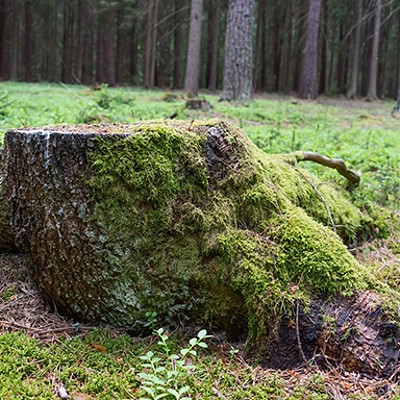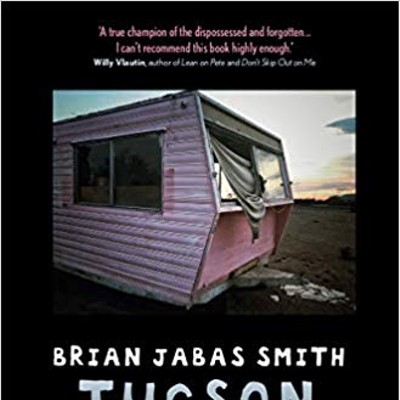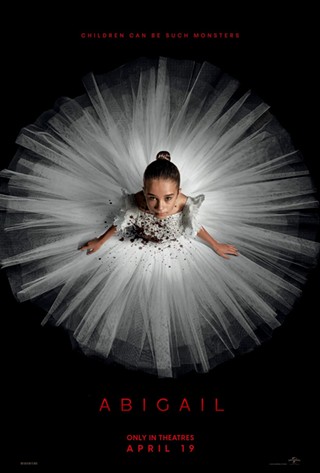But if you're one of those whiny liberals who actually thinks that the United States government is supposed to cater to every passing whim of a group of drowning people who just happen to live within the country's borders, then you might "enjoy" Trouble the Water, a sort of homemade documentary about what happens when the federal agencies charged with managing disasters adopt a properly laissez-faire attitude and just let the free market sort out who lives and who dies.
The film starts with Kimberly Roberts and her husband, Scott, showing up at a refugee center and announcing that they have some footage of the hurricane. But unlike the footage that's been pounding the news channels, Kim's footage is shot by someone who was trapped in the city as the floodwaters reached rooftops, killed scores of people and created an atmosphere that looked like a combination of a 1970s disaster movie and a 1980s slasher flick.
Trapped inside their attic and unable to leave the city due to a lack of funds (there was surprisingly little in the way of organized evacuation, and the government provided almost no transportation), Kimberly and Scott banded together with a few other survivors and did the things that people do when they don't want to die.
At this point, the film is truly frightening. You watch as food is running out; the streets are dense with muddy water; and those left behind are in legitimate danger. At one point, a recording of a 911 call is played. A woman begs for help, and is told that no help is coming. "So I'm just going to die here?" she asks. The 911 operator has no answer.
But at the same time, the film is uplifting to watch as the refugees try to help each other. One man, who apparently had been a petty criminal and an enemy to Scott Roberts before the flood, goes around with a makeshift raft made out of a punching bag, rescuing people and bringing them to higher ground.
But for each act of heroism, there are corresponding moments of stupidity, cupidity and rule-bound cruelty. When the soggy survivors arrive at a military base where hundreds of dry beds await, they're told to leave. They try to protest, but are warned that they'll be shot if they don't move on. I guess the guards assumed that America needed to protect her clean sheets and unused emergency facilities. I mean, what if the New Orleans refugees used all that stuff up, and then some white people needed it?
After they escape the city, the film follows Kimberly and Scott as they try to rebuild their lives. At this point, Kimberly is no longer the cinematographer, and the camera work improves markedly (filmmakers Carl Deal and Tia Lessin, who met Kimberly and Scott at the Red Cross refugee center, take over), but she remains the narrator, which is a big plus.
Kimberly speaks in a heavy dialect, and that adds a lot to the film. Speakers of nonstandard American dialects are most frequently presented in films as uneducated criminals. Kimberly is indeed involved in small-time crime before the film starts, but her narration shows that, whatever the limits of her education, she's no idiot. She's in charge of the structure and thrust of the early part of the movie. It's a strange effect, and it immediately alters the meaning of her idiom; no longer does it seem to mark her as some sort of character type. Instead, it becomes simply the voice of the situation, with a great deal of authority and insight. I can't recall another incidence of someone speaking as she does while acting as a narrator and director.
Scientific linguists should be particularly thrilled by this, as they're always going on about the thoughtlessness of the unscientific grammarians who reinforce class differences by means of artificial rules of syntax. I thought it was cool to hear another type of English; when Raymond Chandler, Frank McCourt and Mark Twain wrote in dialects, they added a richness to the language. Somehow, Kimberly Scott's dialect hasn't been thought of as rich so much as degenerate. It'd be nice if Trouble the Water had an effect in changing that.
While I might be particularly fascinated by linguistic issues, the film itself will compel anyone because of the way it deals with human issues. The obvious pain and horror of being abandoned, combined with the resilience and overwhelming goodness that people exhibited in front of Kimberly Scott's camera, would make this a moving film even if it were a work of fiction. As a documentary, it's an important reminder of the innate morality that people sometimes exhibit under stress--and why we need a moral government.













